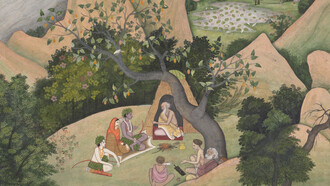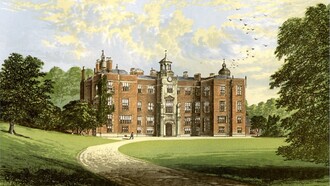There’s always been some kind of allure of reading the classics. Take for instance Rory Gilmore curled up with the book or Maeve Wiley casually dropping sharp references to Virginia Woolf. They inspired the whole Lit Girl aesthetic, attracting viewers by their intellect, depth, and wit.
Who doesn’t want to make an impression on a first date or leave opponents speechless by astute remarks? So, motivated and curious, you finally decide to crack open your grandma’s bookshelf. But then it hits you: dense language, confusing historical references, and the lingering anxiety of essay deadlines.
If classic literature still feels more like a punishment, but you’re willing to give it another shot, here are five books that will gently pull you in and make you stay.
To Kill a Mockingbird by Harper Lee (1960)
Unexpectedly, To Kill a Mockingbird became a comfort book for me, even though the themes it explores are anything but comforting. Set in the Deep South, Alabama, the novel centers on the trial on a black man falsely accused of raping a white girl. It's the 1930s, and the town is steeped in prejudice, injustice, and deeply rooted racism.
But don't rush to put this book aside. Despite its heavy social commentary, this book is super accessible thanks to the way it’s written—through the curious eyes of Scout Finch, a young girl growing up in a world she doesn’t fully understand yet. That way, To Kill a Mockingbird is both piercing and warm, filled with moments of childhood innocence that soften the darker truths.
Why it’s a good start: This book is perfect for nostalgic evenings when, flipping through the pages, you suddenly feel six years old again, wandering barefoot through a hot summer town and spinning stories about that scary house down the street.
Fahrenheit 451 by Ray Bradbury (1953)
If Ray Bradbury could get a teenager to read classics, I'm sure he could get anyone to read. My love for Ray Bradbury began when I was 15, and honestly, I could swap out Fahrenheit 451 for almost any of his works and still be sure it’d be a good read for you. It’s this rare case when it’s about whom to read rather than what to read. With equal pleasure, I’ve read his writings in sci-fi, coming-of-age novels, and even horror. So, feel free to choose any; however, I’ll focus my attention on this one.
All fiction lovers, this is your ticket into the world of classics. Written in 1953, Fahrenheit 451 is still iconic for a reason. The story takes place in a dystopian future where books are banned and "firemen" burn them. Sounds familiar? For me, yes. There’s something chillingly current about the idea of erasing knowledge and numbing people with a ton of misleading information.
Why it’s a good start: Bradbury’s voice keeps the narrative gripping while subtly teaching that knowledge isn’t just power—it’s rebellion.
Address Unknown by Kathrine Taylor (1938)
Published in 1938 in the U.S., this short novel was a warning about the rise of the Nazi regime, so accurate and sharp that it was banned across Europe. Address Unknown is told entirely through an exchange of letters between two close friends: Max, a Jewish-American art dealer, and Martin, a German who returns to his homeland just as Hitler rises to power.
As Hitler becomes Chancellor of Germany, Max and Martin’s friendship is put to the test. Through Martin’s character, we see how propaganda and fear distort personal loyalties and moral compasses. His transformation reflects how ordinary people were manipulated into becoming supporters of a horrifying regime.
Why it’s a good start: Told entirely in letters, this book can be read within one hour. But in that short time, Address Unknown delivers a powerful emotional impact and a good lesson on how ideology can quietly destroy human relationships.
The Handmaid’s Tale by Margaret Atwood (1985)
Written 40 years ago, this work of speculative fiction is as relevant as never. The Handmaid’s Tale reads like a personal record, offering us a glimpse into the life of Offred who lives in the fictional Republic of Gilead where handmaids are given the prefix “Of-” the Commander’s name they’re assigned to. She has only one assignment—to give birth.
I won’t lie by telling you that it’s an easy read, but it’ll get you into reading and keep you turning pages. Moreover, the ongoing erosion of reproductive rights and the increasing measures to force women into childbirth around the world led Margaret Atwood to write a sequel, The Testaments (2019), which continues the exploration of power, control, and resistance within the oppressive society of Gilead.
Why it’s a good start: For everybody who is interested in feminist classics, it’s a good start. For everybody who liked the series, it’s a good start. It’s a good start for everybody who values the importance of safeguarding freedom and equality.
Anne of Green Gables by L.M. Montgomery (1908)
Anne of Green Gables is a light, easygoing feel-good book that tells the story of a little girl growing up on the farm of Matthew and Marilla, a pair of elderly siblings. As the siblings actually expected a boy, who would help them on the farm, Anne has to prove herself that she can help as good as a boy.
Anne, with her friendly, curious, dreamy, and talkative nature, is a girl you can’t help but like. Over time, she grows up, faces challenges, learns important life lessons, and becomes a mature, brave woman who knows how to stand up for herself.
Why it’s a good start: What made this book one of my favorites is Montgomery’s vivid, lyrical voice. She managed to create a whole new, romantic world in my head, the one I loved diving into every time I read further. When the book came to an end, I was sad because I didn't want it to be over. But for anyone who feels the same, here’s the good news: there are several more books about dear Anne.
P.S. As with any other book, choose the classics that revolve around the topics you are genuinely interested in.















